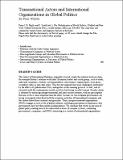|
Reseña:
|
The subject of International Relations originally covered simply the relations between states, for example Britain’s relations with India. Economic bodies and social groups, such as banks, industrial companies, students, environmentalists, and women’s organisations, were given secondary status as non-state actors. This two-tier approach has been challenged, particularly by the effects of globalisation. First, ambiguities in the meaning given to ‘a state’, and its mismatch with the contemporary world, result in it not being a useful concept. Greater clarity is obtained by analysing intergovernmental and inter-society relations, with no presumption that one sector is more important than the other. Second, we can recognize governments are losing sovereignty when faced with the economic activities of transnational companies and the violent threat from criminals and guerrillas. Third, non-governmental organizations (NGOs) engage in such a web of global relations, including participation in diplomacy, that governments have lost their political independence. We conclude that events in any area of global policy-making have to be understood in terms of complex systems, containing governments, companies, and NGOs interacting in a variety of international organizations. |

